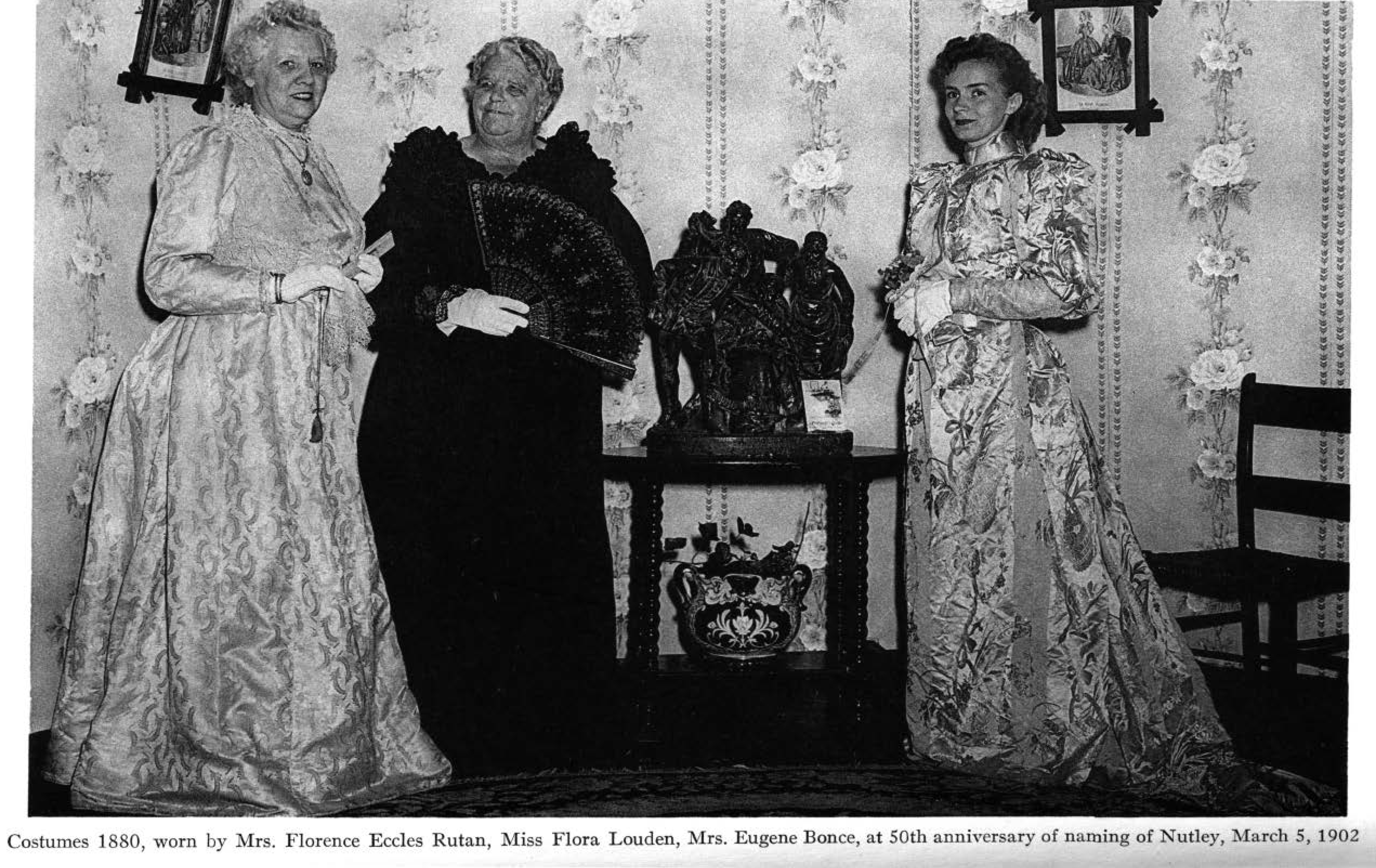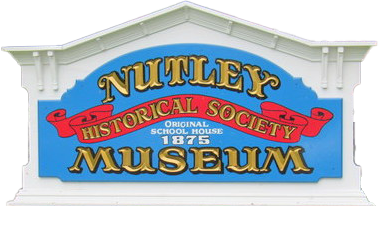THE FRIDAY AFTERNOON CLUB
MRS. LOUIS TRIMNELL JR.
“How empty learning and how vain is Art,
But as it mends the life and guides the heart”
YOUNG
IN February, 1904, Mrs. William J. Kinsley, well known for her interest in civic affairs, invited a group of women to meet at her home on Prospect Street, with the idea of forming a club, the object of which was to supply mutual help and improvement in the study of literature, art and general information.
Thus was organized the first club for women of Nutley, with Mrs. Kinsley as president.
The membership was limited to thirty, and of the twenty-five charter members, most lived in West Nutley.
On October 8, 1911, The Friday Afternoon Club was admitted to membership in the State Federation of Women’s Clubs, and during our membership we contributed to the Yardley Memorial Fund of N.J.C. and also gave one hundred dollars to the same college. We resigned from the federation in 1941.
It was largely through the efforts of Mrs. Kinsley and Mrs. Finn, a later president of the club and their husbands, that the Nutley Library was started. A tree was later planted on the Library lawn in honor of Mrs. Kinsley.
It is interesting to note that from our limited membership were drawn the founders of other permanent organizations for women.
Mrs. Perley Prior, Mrs. Joseph Little and Mrs. Horace Tantum were presidents of the Woman’s Club of Nutley.
The first three commissioners and charter members of the Girl Scout Council, Mrs. Stoddart, Mrs. A. L. Harlan and Mrs. L. C. Pratt, who were builders of the Scout Program, were recruited from the Club membership. Mrs. M. C. Buchenberger, also a member, was Girl Scout Commissioner in later years.
We have had among our members several women with great musical ability. Mrs. Leon Carson and Mrs. David Ramsay were accomplished pianists and Mrs. L. C. Pratt, Mrs. Arthur Hebert and Mrs. Philip Woodcock gave generously of their talents as soloists, not only to our club, but to many town activities. Mrs. Henry Woodcock, Mrs. Louis Newton and Miss Marion S. Walker have had verse published.
The early programs were varied in scope, covering American literature, both classical and current, American history and topics of the day. The neighbors of the United States were not neglected, Hawaii, the Philippines, Puerto Rico and Alaska were presented to the members. Music and Art also had a prominent place on the programs, including the poetry and songs of Robert Burns.
It is difficult to mention in detail the topics covered by Club programs through the early years of 1904 to 1913. No part of the civilized world, its art and literature, its science, including medical progress, was neglected.
In 1914 the first World War was upon us, and the Club seriously considered abandoning our meetings for the duration, but fortunately, the decision was reached that the friendly contact and spiritual uplift which all found in our gatherings would increase each member’s capacity for serious contribution to the war effort.
Although limited in funds, the Friday Afternoon Club contributed to the furnishing of the “Haversack,” a recreation hall for our soldiers, and collected five hundred and fifty books for them. We also gave support over a period of years to two French orphans.
After the war, the programs were less varied and several years were devoted exclusively to the study of the novel, its history, development and types-historical, romantic, realistic and psychological. Another year was devoted to American authors, from early colonial to the modern. Then English history and literature, and causes of the French Revolution took a year’s study.
Mrs. Charles S. Lecky, a past president, several times invited the Club to attend lectures and readings at the Town Hall, New York, as guests of her husband, and at one time she took us on a tour of many historic places in downtown New York, acting as our guide.
We devoted several programs to the study of opera, having the story read and excerpts played or sung by members or guest artists.
During the period between the World Wars many programs were devoted to the study of world peace and the means of attaining it.
We have had a birthday party every five years, a guest day every two years when we entertain our friends and the presidents of other women’s organizations of Nutley, and a joyous Christmas party each year when we display our literary talent in the form of original verse accompanying a small gift.
The Spring of 1952 was the date of Nutley’s 50th Anniversary. On our guest day, in the spirit of the historical celebration of the town, the theme of the program was “The Arts of Nutley.”
Mrs. Henry Woodcock read an original poem and the Poetry of Mrs. Newton was also read. Biographical sketches of the painter, Reginald Marsh, author, Frank Stockton, and Mrs. Powers, a Nutley composer, were read. Selections from Mrs. Powers’ works, both vocal and instrumental were given by our guest artists.
Looking back over the fifty-six years of our club life, reviewing the programs and remembering those with whom we have worked, we feel that Mrs. Kinsley is with us in spirit, rejoicing that we have not wasted our heritage, but have grown along the lines she had in mind when she founded the club; that the spirit of love, loyalty and cooperation is still ours and that we have earned for ourselves a reputation in Nutley worthy of the high ideals she set for us.
The present officers are: President, Mrs. Louis Trimnell, Jr.; Vice President, Mrs. W. E. Slemmer; Secretary, Mrs. G. P. Kelly; Treasurer, Mrs. Vincent Binn.
Committees are: Literary, Mrs. W. E. Slemmer, Mrs. A. E. Brooks, Mrs. G. P. Kelly, Mrs. A. L. Harlan, and Mrs. G. R. B. Symonds; Music, Mrs. A. K. Wing, Jr.; Membership, Mrs. S. W. Van Duyne, Mrs. Willard Clary, and Mrs. C. A. Gazan.

